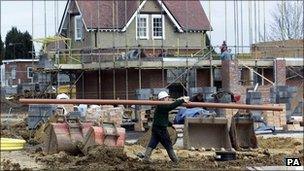Audit Scotland warning over planning black hole
- Published

Planning law changes in 2006 aimed to modernise the system
Problems with the planning system have left a multi million-pound black hole in council finances, Scotland's spending watchdog has warned.
Audit Scotland said the shortfall had risen from £6.7m to £20.8m in the last six years - despite a 29% drop in the number of planning applications.
The watchdog said councils were having to fill the gap between spending and the amount they got back from fees.
The government said work was under way to improve performance.
New laws in 2006 aimed to modernise the planning system.
The umbrella body for Scotland's 32 councils, Cosla, said it was already in discussions with the government over issues raised in the report.
Spending gap
Audit Scotland said more information was needed to see whether efficiencies were being made.
John Baillie, chairman of the Accounts Commission, said: "Our planning system plays a key role in sustaining and growing our economy and shaping our communities.
"The time taken to decide planning applications is not reducing and the gap between income and expenditure is widening and becoming increasingly unsustainable."
Mr Baillie said councils were lacking in detailed information on the costs of handling planning applications, adding: "Understanding these costs and why they have increased is a necessary first step in identifying where efficiencies can be made."
The Audit Scotland report pointed out that half the spending on planning applications in 2009-10 was offset by income from fees, compared with 81% in 2004-05.
The balance, it pointed out, was being met from council budgets "already under increasing pressure both from rising demand and increasing costs".
The biggest spike in spending came the year the planning reforms were introduced.
Despite the concerns, Audit Scotland said public bodies involved in planning were now working better together.
Scottish Planning Minister Aileen Campbell, said: "Scotland's planning system has been through its most fundamental reform in 60 years and I'm encouraged that the Audit Scotland report recognises the Scottish government's leadership of this and the progress that's been made over the last few years.
"We are now concentrating on sharpening our focus on performance and delivery to make sure the planning system does all it can to support sustainable economic growth for Scotland.
"Some of the areas raised by the report are already being taken forward such as the reform of permitted development rights."
Reacting to the report, Argyll and Bute councillor Alison Hay said: "There are some issues which were either not mentioned in the report or need highlighting, for example, a reducing planning workforce, pre-applications, e-planning, local review bodies and, of great concern, planning fees, particularly during ever diminishing resources for public services in Scotland as a whole.
"Cosla is presently in discussions with the Scottish government about many of these issues.
"One final point also worth mentioning is that all of us involved in the planning process have a part to play in its modernisation - the whole burden cannot be left to councils."